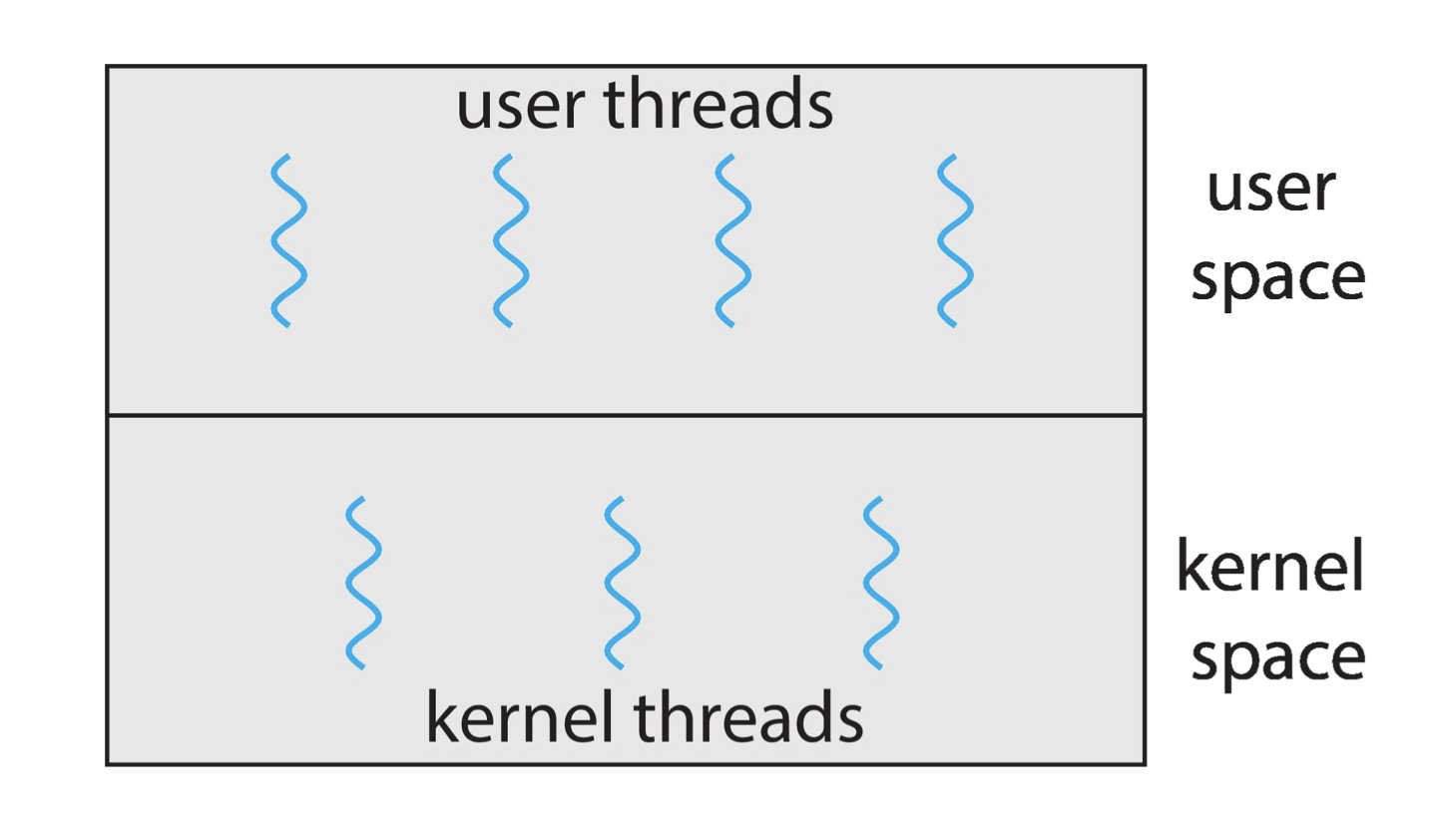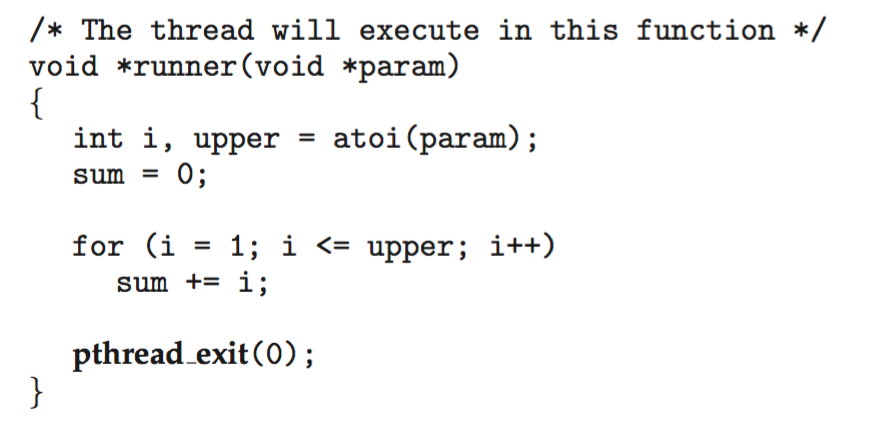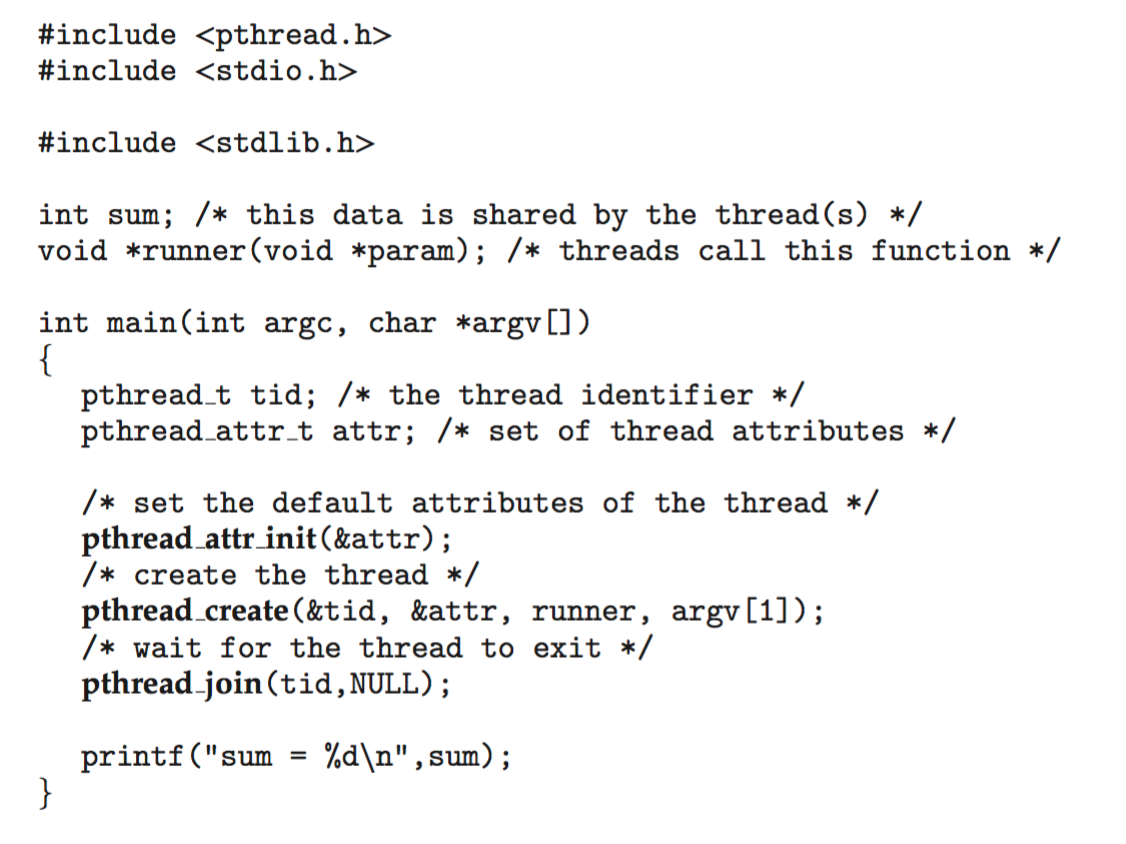A single process can have multiple code segments which are called threads that run concurrently within the context of that process.
Multiple tasks within a process can be implemented by separate threads
Processes that utilise threads are called Multithreaded Processes
- Every thread belongs to a Process
- A process initially has only one thread called the main thread
Threads Share:
- Code
- Data / Heap
- Files
Each Thread Holds its Unique:
- Program Counter Value
- Registers
- Stack
| Process | Thread |
|---|---|
| Heavy | Light |
| Interaction with OS | No Interaction with the OS |
| Operate Independently | Sharing of data between other threads |
| Have a PCB | Have a TCB |
TCB
Thread Control Block
Stores the data related to each thread
Stored within the program’s memory
Types

User Threads
Management is done by the User-Level threads library
Primary Threads Library:
- POSIX Pthreads
- Windows Threads
- Java Threads
Kernel Threads
System Level Threads, which belong to the System Processes, acting on the Kernel
Virtually all general purpose operating systems have these
Correlation with State Process Model
If one of the thread of a process requires an I/O operation, according to the Process Model used in the CPU, that entire process needs to be blocked and hence all of its other threads will also be blocked
If a process or even if one of its thread requires an I/O operation, the whole process is blocked
Threads share data and thus to control synchronisation, all other threads should be blocked when even one of the thread is communicating with I/O
Exception
-
Kernel Threads
- They are working within the Kernel Area and thus Kernel / OS are familiar that which thread requires I/O and how the synchronisation should be dealt
| User Threads | Kernel Threads |
|---|---|
| Lower Overhead of Switching | Higher Overhead of Switching |
| Implementation by a Thread Library | Implementation directly by the OS / Kernel |
Creation / Implementation
pthread_create(pthread_t*, NULL, void*, void*)
pthread_t - Pointer of Thread ID
return -1 = Error
return 0 = Successful Creation| Commands | Description |
|---|---|
| pthread_create | Creation of a thread |
| pthread_self | Get the current thread id |
| pthread_join | Wait for a thread |
| pthread_exit | Exit a thread without exiting process |
Example
Consider we have the following function:

Following is the main function / process:

Multithreading
Multithreading allows the application to divide its task into individual threads. In multi-threads, the same process or task can be done by the number of threads, or we can say that there is more than one thread to perform the task in multithreading. With the use of multithreading, multitasking can be achieved
Multithreading Models
In an operating system, threads are divided into the user-level thread and the Kernel-level thread. User-level threads handled independent form above the kernel and thereby managed without any kernel support. On the opposite hand, the operating system directly manages the kernel-level threads. Nevertheless, there must be a form of relationship between user-level and kernel-level threads.
Tip
Also look into thread synchronisation.
Misc
What happens when you call a fork() in a thread?
The fork() system call creates a new process by duplicating the calling process. However, when called within a multithreaded program, the behaviour can be complex and platform-dependent. In general, the new process will have a single thread, a copy of the calling thread, and any other threads in the calling process are not duplicated. The child process will start its execution from the point of the fork() call.
Example
func(){
pid_t pid;
for(int i=0; i<2; i++)
pid = fork();
printf("Bye!");
exit(NULL);
}
pid_t t1;
pthread_create(&t1, NULL, func, NULL);
pthread_join(&t1, NULL);
fork()
printf("Hello!");What happens if process returns without waiting for its threads?
If the thread has done some execution while the process was active then that will count however, as soon as the parent process terminates, all of its threads are discarded.
What happens when a thread calls an exit() function?
When a thread calls the exit() function, it terminates not only the calling thread but also the entire process. The exit() function is typically used to gracefully terminate the program, and it causes the termination of all threads within the process.
Can a function that is a part of the program be called from a thread?
Yes, a function that is part of the program can be called from a thread. Threads in a program share the same address space, and they can execute any function or code that is accessible within that address space. However, caution is needed to ensure proper synchronisation mechanisms (e.g., mutexes) are in place to avoid data corruption in a multi-threaded environment.
What happens when you call pthread_exit() in the main thread?
If pthread_exit() is called in the main thread, it will terminate just the main thread, not the entire process. Other threads, if any, will continue to execute. It’s a way to exit the main thread while leaving other threads running. The resources associated with the main thread will be released once it exits.
Why do we fork when we can use threads?
Forking and using threads serve different purposes. Forking creates a new process, which is useful for parallelism and creating independent processes. Each process has its own address space and runs independently of the others. On the other hand, threads share the same address space, making them suitable for tasks that can benefit from shared data and communication between threads. The choice between forking and using threads depends on the specific requirements of the task and the desired concurrency model. In some cases, a combination of both processes and threads might be appropriate.

